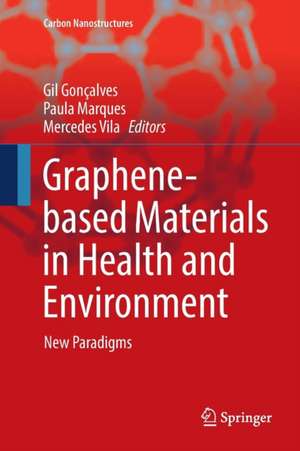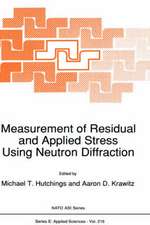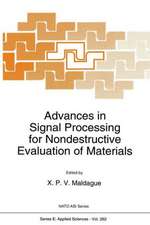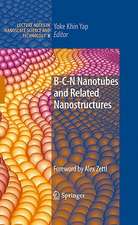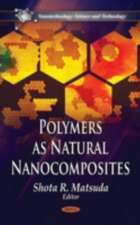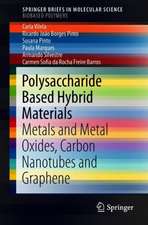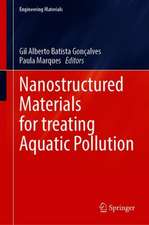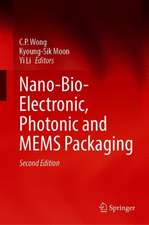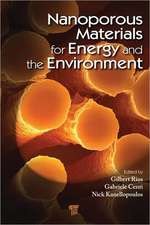Graphene-based Materials in Health and Environment: New Paradigms: Carbon Nanostructures
Editat de Gil Gonçalves, Paula Marques, Mercedes Vilaen Limba Engleză Paperback – 4 iul 2018
| Toate formatele și edițiile | Preț | Express |
|---|---|---|
| Paperback (1) | 947.85 lei 6-8 săpt. | |
| Springer International Publishing – 4 iul 2018 | 947.85 lei 6-8 săpt. | |
| Hardback (1) | 953.97 lei 6-8 săpt. | |
| Springer International Publishing – 16 dec 2016 | 953.97 lei 6-8 săpt. |
Din seria Carbon Nanostructures
- 15%
 Preț: 655.60 lei
Preț: 655.60 lei - 18%
 Preț: 1217.27 lei
Preț: 1217.27 lei - 5%
 Preț: 715.91 lei
Preț: 715.91 lei - 15%
 Preț: 634.32 lei
Preț: 634.32 lei - 15%
 Preț: 637.59 lei
Preț: 637.59 lei -
 Preț: 385.84 lei
Preț: 385.84 lei - 18%
 Preț: 953.97 lei
Preț: 953.97 lei - 18%
 Preț: 724.29 lei
Preț: 724.29 lei - 15%
 Preț: 640.06 lei
Preț: 640.06 lei - 18%
 Preț: 1000.24 lei
Preț: 1000.24 lei - 15%
 Preț: 646.30 lei
Preț: 646.30 lei - 18%
 Preț: 949.73 lei
Preț: 949.73 lei - 15%
 Preț: 632.70 lei
Preț: 632.70 lei - 18%
 Preț: 999.76 lei
Preț: 999.76 lei - 18%
 Preț: 1393.72 lei
Preț: 1393.72 lei - 18%
 Preț: 951.14 lei
Preț: 951.14 lei - 18%
 Preț: 725.13 lei
Preț: 725.13 lei
Preț: 947.85 lei
Preț vechi: 1155.91 lei
-18% Nou
Puncte Express: 1422
Preț estimativ în valută:
181.39€ • 188.30$ • 151.25£
181.39€ • 188.30$ • 151.25£
Carte tipărită la comandă
Livrare economică 24 martie-07 aprilie
Preluare comenzi: 021 569.72.76
Specificații
ISBN-13: 9783319833354
ISBN-10: 3319833359
Ilustrații: IX, 356 p. 107 illus.
Dimensiuni: 155 x 235 mm
Greutate: 0.51 kg
Ediția:Softcover reprint of the original 1st ed. 2016
Editura: Springer International Publishing
Colecția Springer
Seria Carbon Nanostructures
Locul publicării:Cham, Switzerland
ISBN-10: 3319833359
Ilustrații: IX, 356 p. 107 illus.
Dimensiuni: 155 x 235 mm
Greutate: 0.51 kg
Ediția:Softcover reprint of the original 1st ed. 2016
Editura: Springer International Publishing
Colecția Springer
Seria Carbon Nanostructures
Locul publicării:Cham, Switzerland
Cuprins
Medical applications of graphene – an overview.- Graphene-based materials in biosensing, bioimaging, and therapeutics.- Hybrid Graphene Metallic Nanoparticles for Biodetection.- Stem cells commitment on Graphene based scaffolds .- Graphene: an emerging carbon nanomaterial for bone tissue engineering.- Potentiality of graphene-based materials for neural repair.- Graphene-based smart nanomaterials: novel opportunities for biology and neuroengineering.- Stimulus responsive Graphene scaffolds for tissue engineering.- Graphene hybrid architectures for chemical sensors.- Antimicrobial properties of graphene nanomaterials: mechanisms and applications.- Toxicity and Environmental Applications of Graphene-based Nanomaterials.
Notă biografică
Gil Gonçalves graduated in 2003 in Chemistry and obtained a Master’s degree in Materials Science in 2008 from the University of Aveiro (Portugal). In 2012 he received his Ph.D in Mechanical Engineering from the Center for Mechanical Technology and Automation (TEMA) University of Aveiro (UA), where he then pursued research on the development of graphene nanocomposites for biomedical and environmental applications until 2016. After obtaining a Marie Curie research fellowship, he started working at the Institute of Material Science of Barcelona-High Council of Spanish Research (ICMAB-CSIC) on the development of ultra-sensitive nanotherapeutic anticancer agents. Currently, he is also a member of the editorial board of Nature Publishing Group’s Scientific Reports in the field of chemical physics.
Mercedes Vila is currently the scientific director of Coating Technologies S.L. and guest assistant professor at the University of Aveiro’s Mechanical Engineering Department TEMA Research Unit. Her main research interests focus on the surface modification and functionalization of materials and materials behavior under different environments, e.g. biomaterials–cell interactions under physical stimuli, tribological responses and environmental remediation.
Paula Marques is a principal investigator in the Nanoengineering Group of TEMA research unit at the University of Aveiro. Paula’s research interests are related to the engineering and development of new, nanostructured materials that may offer solutions to societal problems. She started working with carbon nanostructures in 2007, and has been exploring the potential of graphene oxide for health and environmental applications since 2010, with the aim of engineering solutions that foster a cleaner, healthier, safer and more sustainable world.
Textul de pe ultima copertă
This book provides a comprehensive overview of the potential use of graphene-based materials in two important societal areas: medicine and the environment. It discusses how new graphene-based materials can be creatively used for biological purposes, for example as delivery vehicles for diagnostics or therapeutics, ultrasensitive sensors, smart responsive substrates for artificial-tissue design and biomarkers. Moreover, it presents new insights into their use as sorbent or photocatalytic materials for environmental decontamination in water and gas-phase desalination membranes and as sensors for contaminant monitoring, giving relevance to the current discussions on the possible toxicological effects of graphene-based materials.
Caracteristici
Reviews and discusses how graphene materials can be used for biological purposes Describes the use of graphene materials as delivery vehicles for diagnostics or therapeutics Offers new insights into the use of graphene materials as desalination membranes Includes supplementary material: sn.pub/extras
